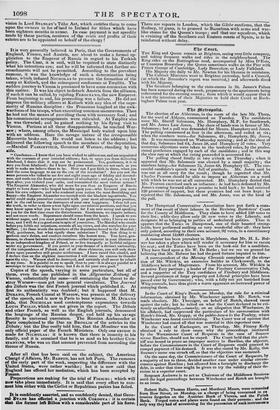It is very generally believed in Paris, that the Governments
of England, France, and Austria, are about to make a formal ap- plication to the Emperor of Russia in regard to his Turkish policy.. The Czar, it is said, will be required to state distinctly what his intentions are; and be will be informed that further en- croachments will not be permitted. According to the prevalent rumour, it was the knowledge of such a determination being taken, which. induced NICHOLAS to procure the formation of the camp at ICalisch, and the subsequent conference at Tceplitz. The sudden journey to Vienna is presumed to have some connexion with this matter. It was his object to detach Austria from the alliance, if such it can be called, by cajoling FERDI NAND, the new Emperor. From beginning to end, his proceeding was a failure. He did not impress the military officers at Kalisch with any idea of the supe- riority of Russian discipline : the Prussians laughed at the awk- wardness of his troops, when executing common manceuvres. Then be had not the means of providing them with necessary food; and Lis commissariat arrangements were ridiculed. At Tmplitz also be was thwarted; and he gained nothing by his flying visit to Vienna. Furious at all these disappointments, he reached War- saw ; where, among others, the Municipal body waited upon him with an address. Here the savage nature of the irresponsible Muscovite broke out. He would not listen to the address ; but delivered the following speech to the members of the deputation, —Marshal PAsittevircH, Governor of Warsaw, standing by his side.
" Gentlemen—I know that you have wished to address me, and am acquainted with the contents of your intended address; but, to spare you from delivering falsehood, I desire that it may not be pronounced. Yes, gentlemen, it is to save you from falsehood ; for I know that your sentiments are not such as you wish to make me believe them to be. How can I put faith in them, when you held the same language to me on the eve of the revolution ? Are you not the same persons who talked to me five and eight years ago of fidelity and devoted- ness, and made me the finest protestations of attachment ; and yet, in a very few days after, you violated your oaths, and committed the most violent actions ? The Emperor Alexander, who did more for you than an Emperor of Russia ought to have done—who heaped benefits upon you—who favoured you more than his own subjects, and who rendered your nation the most flourishing and happy—the Emperor Alexander was treated with the blackest ingratitude. You
n ever could make yourselves contented with your most advantageous position, and in the end became the destroyers of your own happiness. I thus tell you the truth, in order to throw a true light upon our relative positions, and that you may know upon what you have to depend ; for I am now seeing and speaking to you for the first time since the disturbances. Gentlemen, we require actions, and not mere words. Repentance should come from the heart. I speak to you without anger, and you must perceive that I am perfectly calm; I have no ran- cour, and I will do you good even in spite of yourselves. The Marshal who stands before you fulfils my intentions, seconds slimy views, and also watches for your welfare. [At these words the members of the deputation bowed to the Marshal.] Well, gentlemen, but what signify these salutations ? The first thing is to perform one's duties, and conduct ourselves like honest men. You have, gen- -tlemen, to choose between two alternatives—either to persist in your illusions as to an independent kingdom of Poland, or to live tranquilly as faithful subjects under my government. If you persist in your dreams of a distinct nationality, of the independence of Poland, and of all these chimeras, you will only draw down upon yourselves still greater misfortunes. I have raised this citadel, and I declare that on the slightest insurrection I will cause its cannon to thunder upon the city. Warsaw shall be destroyed, and certainly shall never be rebuilt in ray time. It is painful to me to speak thus to you—it is always painful to a sovereign to treat his subjects thus; but I do it for your own good."
Copies of the speech, varying in some particulars, but all of them, even the one published in the Allgemeine Zeitung of Vienna, substantially the same—all containing the threat to de- stroy Warsaw—soon got into general circulation. The Journal des Debate was the first French journal which published it. At first its authenticity was doubted ; but it happened that M. DURAND, French Consul at Warsaw, was present at the delivery of the speech, and is now in Paris to bear witness. M. DURAND adds, that NICHOLAS used contemptuous expressions towards Louts PHILIP, which are not given in the report. The Debate and other French, as well as the English journals, denounced the language of the Russian despot, and held up his se% age ferocity to universal execration. The Russian Ambassador at Paris complained to the Due DE BROGLIE of the articles in the Debate; but the Duo coolly told him, that the Moniteur was the only official paper of the French Ministers. Only one excuse is made for NICHOLAS: it is known that there is insanity in his family, and it is surmised that he is as mad as his brother CoN- gramme, who was on that account prevented from ascending the throne of Russia.


























 Previous page
Previous page